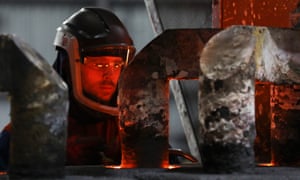Technology has been unveiled that could drastically cut greenhouse gas emissions from aluminium production, in a development that could transform the way one of the world’s most common materials is made.
Aluminium is used to make cars, construction materials, industrial machinery, electrical products, drinks cans, foil packaging and much more. But its production relies on processes that have changed little since the 1880s when the first smelting processes were pioneered.
On Thursday the Canadian government and two of the world’s biggest aluminium producers, Alcoa and Rio Tinto, hailed a “breakthrough” technology that they said would remove carbon dioxide from the smelting process. Executives from the companies said it was “the most significant development in aluminium in a century”.
The companies said the change would reduce carbon dioxide production by 6.5bn tonnes a year in Canada alone, where it is first being rolled out. That is equivalent to taking about 1.8m vehicles off the road. The technology would also reduce operating costs by about 15%, the executives said.
Carole Ferguson, the head of investor research at the Carbon Disclosure Project, which rates businesses and sectors on their performance in reducing carbon, said: “This is very important. It is fantastic to have this technology that reduces carbon and eliminates it from the [smelting process].”
However, she said aluminium production would still require large quantities of energy, and emissions from the production process were only a part of its overall carbon footprint.
Smelting aluminium conventionally requires anodes made of carbon-rich material as carbon is a good conductor of electricity as well as being cheap and plentiful. They are used to release the metal from aluminium oxide. During the process the carbon anodes are destroyed, releasing carbon dioxide gas.
Alcoa and Rio Tinto’s new process involves the use of a proprietary material they invented and developed over a decade that can be used in place of carbon. When used in smelting, it releases oxygen instead.
The new process will not reduce the need for vast quantities of energy in the smelting process, but if it comes from renewable sources it will in effect mean the aluminium produced is carbon-free.
Aluminium production accounts for about 0.8% of global greenhouse gas emissions and demand is rising. But it is also a material at the core of plans to reduce emissions. For instance, aluminium cars are lighter than vehicles made from steel, requiring less fuel. Aluminium is also easy to recycle, giving it the potential to be a “green” resource.
Alcoa and Rio Tinto have formed a joint venture, Elysis, to exploit the new smelting material, which they said had been proven to work at industrial scale in plants. Investors in the $144m (£106m) project include the Canadian and Quebec governments, and Apple, which helped broker the deal between the rival aluminium companies and which intends to use the resulting product in its hardware.
Products using the new technology are not expected to become commercially available until about 2024.
While most of the world’s greenhouse gas emissions come from energy production for electricity, transport, and heating and cooling, a sizeable chunk also comes from industrial processes, such as the production of plastics, petrochemicals and cement. But methods of reducing emissions from industrial processes have proved difficult to develop.
Researchers working on cement production, which emits carbon dioxide as calcium carbonate is broken down, have explored using graphene and other materials to reduce emissions.

